====================
A homily offered by the Rev. Dr. C. Eric Funston on Pentecost Sunday, June 4, 2017, to the people of St. Paul’s Episcopal Church, Medina, Ohio, where Fr. Funston is rector.
(The lessons for the service are from the Revised Common Lectionary: Acts 2:1-21; Psalm 104:25-35,37; 1 Corinthians 12:3b-13; and St. John 7:37-39. These lessons can be read at The Lectionary Page.)
====================
 Almighty God, on this day you opened the way of eternal life to every race and nation by the promised gift of your Holy Spirit who empowered the disciples to proclaim the Good News to peoples from many lands speaking many tongues: we now pray for those in many lands speaking many languages who have been hurt or killed by terrorist violence in the past fortnight in: London (England), Kabul (Afghanistan), Mosel (Iraq), Minya (Egypt), Khost (Afghanistan), Mastung (Pakistan), Gao (Mali), Borno State (Nigeria), Raqqa (Syria), Mogadishu (Somalia), rural Colombia, Manila (Philippines), Baghdad (Iraq), Basra (Iraq), Portland (Oregon, USA) and Manchester (England). May God grant eternal rest to the departed, healing to the injured, and comfort to those in grief. And since Jesus taught us to love and pray for our enemies, we pray also for those who have committed these violent acts, and for those who may be contemplating additional violence. May God change their hearts and shed abroad the gift of peace throughout the world by the preaching of the Gospel, that it may reach to the ends of the earth; through Jesus Christ our Lord, who lives and reigns with you, in the unity of the Holy Spirit, one God, for ever and ever. Amen.
Almighty God, on this day you opened the way of eternal life to every race and nation by the promised gift of your Holy Spirit who empowered the disciples to proclaim the Good News to peoples from many lands speaking many tongues: we now pray for those in many lands speaking many languages who have been hurt or killed by terrorist violence in the past fortnight in: London (England), Kabul (Afghanistan), Mosel (Iraq), Minya (Egypt), Khost (Afghanistan), Mastung (Pakistan), Gao (Mali), Borno State (Nigeria), Raqqa (Syria), Mogadishu (Somalia), rural Colombia, Manila (Philippines), Baghdad (Iraq), Basra (Iraq), Portland (Oregon, USA) and Manchester (England). May God grant eternal rest to the departed, healing to the injured, and comfort to those in grief. And since Jesus taught us to love and pray for our enemies, we pray also for those who have committed these violent acts, and for those who may be contemplating additional violence. May God change their hearts and shed abroad the gift of peace throughout the world by the preaching of the Gospel, that it may reach to the ends of the earth; through Jesus Christ our Lord, who lives and reigns with you, in the unity of the Holy Spirit, one God, for ever and ever. Amen.
==============================
“The teaching of the wise is a fountain of life,” says the Book of Proverbs (13:14). The word translated there as “teaching” is Torah, the Hebrew name for the Law of God given to Moses on Mt. Sinai. The biblical tradition tells us that seven weeks after the Passover the Hebrews camped at the foot of Mt. Sinai and Moses went up the mountain, met God, and returned with the Torah inscribed on stone tablets. Therefore, the Jews celebrate on the fiftieth day after Passover the feast called Shavuot, which literally means “the feast of weeks.” It is also called “the feast of the giving of the Law” and “the feast of first fruits” because it also became a celebration of the barley harvest and a time of prayer for the success of the wheat harvest; it was a time when the tithe of the barley harvest, the first ten percent of the grain was brought to the Levites in obedience to the Torah’s requirement: “All tithes from the land, whether the seed from the ground or the fruit from the tree, are the Lord’s; they are holy to the Lord.” (Lev. 27:30)
When worship became centered on the Jerusalem Temple in Jerusalem, Shavuot became a pilgrimage feast, one of the three annual festivals on which every male Jew is commanded to make a pilgrimage to the Temple, which explains why there were so many people “Parthians, Medes, Elamites, and residents of Mesopotamia, Judea and Cappadocia, Pontus and Asia, Phrygia and Pamphylia, Egypt and the parts of Libya belonging to Cyrene, and visitors from Rome, both Jews and proselytes, Cretans and Arabs” (Acts 2:9-11) in the streets of Jerusalem when the disciples of Jesus, empowered by the Holy Spirit, went out to proclaim the Good News. They were the Jews of the Diaspora and for many of them, Greek rather than Hebrew was the language in which they read Scripture and worshiped, and they called this feast “Pentecost,” a word which means “fiftieth day.” They had returned to Jerusalem on the fiftieth day after Passover to offer their tithes at the Temple in gratitude for the giving of the Law.
A rabbi of the time famously described the Torah as a “disciplinarian” or “schoolmaster” (Gal. 3:22). Writing in Greek, the word he used was paidagogos, a word describing someone in Greek society, usually a family slave, who was charged with the duty of supervising the life and morals of growing boys. In other words, the paidagogos’ obligation was to teach the boys to be good. This was the purpose of the Law given at Mt. Sinai. A modern rabbi writes that one should immerse oneself in the Torah
to gain a sense of how the Creator of the Universe relates to His creations. To think in a Godly way. It is a sharing of spirit, until the same preferences and desires breathe within . . . you, [until God’s] thoughts are your thoughts and your thoughts are [God’s]. (Tzvi Freeman, What Is Torah?)
That is what we as Christians believe happened in the event described by Luke in today’s reading from the Book of Acts, a sharing of the Holy Spirit of God until God’s preferences and desires breathed within the disciples, until God’s thoughts were their thoughts and they had no alternative but to speak them to the world around them.
That First Century rabbi of whom I spoke was none other than our own parish Patron Saint, Paul of Tarsus, writing to the Galatians. He would continue to say that with the coming Christ we are freed from the discipline of the schoolmaster, and instead are led by the Holy Spirit to bear the “fruit of the Spirit [which] is love, joy, peace, patience, kindness, generosity, faithfulness, gentleness, and self-control.” (Gal. 5:22) Another word that describes this fruit is “virtue,” which St. Augustine of Hippo defined as “a good habit consonant with our nature.” (Catholic Encyclopedia, Virtue)
The “fruit of the Spirit” should not be confused with the gifts of the Spirit. In the epistle reading today from the First Letter to the Corinthians, Paul details many of the gifts of the Spirit (wisdom, knowledge, faith, healing, miracles, prophecy, discernment, speaking in other tongues, and the interpretation of tongues, 1 Cor. 12:8-10), one of which seems to have been exhibited by the disciples, the ability to speak in other languages. While these gifts are important for a variety of reasons, what is most important about them is that they are, Paul says, “given . . . for the common good.” (v. 7)
In Luke’s Gospel, Jesus instructed his listeners to be good, to do good to all, to enemies as well as friends, saying:
Do not judge, and you will not be judged; do not condemn, and you will not be condemned. Forgive, and you will be forgiven; give, and it will be given to you. A good measure, pressed down, shaken together, running over, will be put into your lap; for the measure you give will be the measure you get back. (Lk 6:37-38)
To the Samaritan woman at Jacob’s well, echoing the words the Book of Proverbs applied to the Torah, Jesus promised that those who follow him will receive the water of life which “will become in them a spring of water gushing up to eternal life.” (Jn 4:14) And in today’s gospel lesson in a similar metaphor, he says, “Out of the believer’s heart shall flow rivers of living water.” (Jn 7:38) This is what Pentecost is all about; this is what happened that morning in Jerusalem; the disciples were given a share of the Holy Spirit of God until, as that contemporary rabbi said, God’s preferences and desires breathed within the disciples, until God’s thoughts were their thoughts, until the Torah of the wise became a fountain of life and flowed out of them like living water to the world around them.
So the Law was given to teach us to be good and the Holy Spirit empowers us to be good, but how do we actually be good?
An author whose poetry has often graced the pages of The Christian Century, a magazine to which I have subscribed for many years, offered an answer to that question a few years ago. His name was Brian Doyle; he lived in Portland, Oregon, taught at the University of Portland, and edited Portland Magazine. He died a week ago from the same sort of brain cancer which killed my own brother several years ago, so I took particular note of his passing. At his requiem day before yesterday at the Roman Catholic cathedral in Portland, mourners were given a copy of an essay he wrote and published in his 2013 book The Thorny Grace of It (Loyola Press, Chicago:2013). The essay is entitled How to Be Good. I would like to read part of it to you now:
First, pick up your wet towel and at least, for heavenssake, hang it up to dry. And wipe the sink after you shave. The sink doesn’t have to be shining and spotless, that would be fussy and false, but at least don’t leave little mounds of your neck hairs like dead insects for your partner and children to find. At least do that. It’s the little things; they aren’t little. You knew that. I am just reminding you. Like the dead sparrow that the old lady across the street picked up from the street, where it fell broken and almost unrecognizable, and she saw it as a holy being and she gently dug it into her garden of fading flowers. A little act, but it wasn’t little. It sang quietly of respect and reverence for what had been alive and was thus holy beyond our ken. Or in the morning, when you rush into the shop for coffee, at least say thank you to the harried girl with the Geelong Cats logo tattooed on her forehead. At least look her in the eye and be gentle. Christ liveth in her, remember? Old Saint Paul said that, and who are we to gainsay the testy little gnarled genius? And the policeman who pulls you over for texting while driving, yes, you are peeved, and yes, he could be chasing down murderers, but be kind. Remove the bile from your tongue. For one thing, it actually was your fault, you could have checked the scores later, and for another, Christ liveth in him. Also in the grumpy imam, and in the surly teenager, and in the raving man under the clock at Flinders Street Station, and in the foulmouthed man at the footy, and in the cousin you detest with a deep and abiding detestation and have detested since you were tiny mammals fresh from the wombs of your mothers. When he calls to ask you airily to help him lug that awful vulgar elephantine couch to yet another of his shabby flats, do not roar and use vulgar and vituperative language, even though you have excellent cause to do so and who could blame you? But Christ liveth in him. Speak hard words into your closet and cast them thus into oblivion. Help him with the couch, for the ninth blessed time, and do not credit yourself with good works, for you too are a package of small sins and cowardices, and the way to be good is not to join the Little Sisters of the Poor in Calcutta, but to be half an ounce better a man today than you were yesterday. Do not consider tomorrow. Consider the next moment after you read this essay. Do the dishes. Call your mother. Coach the kids’ team. Purge that closet of the clothes you will never wear and give them away. Sell the old machinery and turn it into food for those who starve. Express gratitude. Offer a quiet prayer for broken and terrified children. Write the minister and ask him to actually do the job he was elected to do, which is care for the bruised among us, not pose on television. Pray quietly by singing. We do not know how prayers matter but we know that they matter. Do not concern yourself with measuring and calculating, but bring your kindness and humor like sharp swords against the squirm of despair and violence. The Church is you. Christ liveth in you. Do not cloak Him but let Him be about His business, which is using the tools the Creator gave you and only you to bring what light you can. You know this. I am only reminding you. Work with all your grace. Reach out. Do not rest. There will be time and time enough for rest. Care for what you have been given. Give away that which you treasure most. The food of the spirit is love given and granted; savor that and disburse that which is not important. Use less, slow down, write small notes. All the way to heaven is heaven, said old Catherine of Siena, and who are we to gainsay that slight smiling genius? Remember that witness is a glorious and muscular weapon. What you see with your holy eyeballs and report with the holy twist of your tongue has weight and substance. If you see cruelty, call it by its true name. If you hear a lie, call it out in the open. Try to forgive even that which is unforgivable. That is the way forward for us. I do not know how that can be so but it is so. You and I know that. I am only reminding us. Be who only you are. Rise to what you dream. Do not cease with joy. That is the nature of the gift we were given. It is the most amazing and extraordinary and confusing and complicated gift that ever was. Never take it for granted, not for an instant, not for the seventh of a second. The price for it is your attentiveness and generosity and kindness and mercy. Also humor. Humor will destroy the brooding castles of the murderers and chase their armies wailing into the darkness. What you do now, today, in these next few minutes, matters more than I can tell you. It advances the universe two inches. If we are our best selves, there will come a world where children do not weep and war is a memory and violence is a joke no one tells, having forgotten the words. You and I know this is possible. It is what He said could happen if we loved well. He did not mean loving only the people you know. He meant every idiot and liar and thief and blowhard and even your cousin. I do not know how that could be so, but I know it is so. So do you. Let us begin again, you and me, this afternoon. Ready? (Page 15)
On this fiftieth day, this feast of the first fruits, this day of bringing our tithes and offerings of thanksgiving before God, this celebration of the giving of the Torah and the coming of the Holy Spirit, this birthday of the church, let us begin again to be good, and let goodness be in us like the Torah of the wise, a spring gushing up to eternal life, running over, and flowing out, a river into the world around us, so that “justice [may] roll down like waters, and righteousness like an ever-flowing stream.” (Amos 5:24)
Empowered by the Holy Spirit, let us begin again to be good, you and me, today! Ready?
====================
Father Funston is the rector of St. Paul’s Episcopal Church, Medina, Ohio.
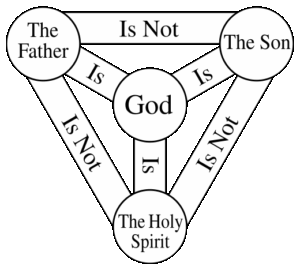 A few weeks ago, as I was looking forward to my annual cover-Rachel’s-vacation gig here at Harcourt Parish, my plan was to preach a sort of two-part sermon on play and playfulness. Seemed like a good summer-time thing to do. Last week, on Pentecost Sunday, I suggested to you that playfulness is a gift of the Holy Spirit, that play is why we were made. Today being Trinity Sunday, I planned to follow-up with a few words about how a metaphor of play and playfulness can help us understand and participate in the relational community which the triune God is.
A few weeks ago, as I was looking forward to my annual cover-Rachel’s-vacation gig here at Harcourt Parish, my plan was to preach a sort of two-part sermon on play and playfulness. Seemed like a good summer-time thing to do. Last week, on Pentecost Sunday, I suggested to you that playfulness is a gift of the Holy Spirit, that play is why we were made. Today being Trinity Sunday, I planned to follow-up with a few words about how a metaphor of play and playfulness can help us understand and participate in the relational community which the triune God is.  One of the things I try to do when I read the stories of Jesus in the Gospels, when he uses an odd or striking metaphor like “I will make you fishers of people”
One of the things I try to do when I read the stories of Jesus in the Gospels, when he uses an odd or striking metaphor like “I will make you fishers of people” I really don’t like television commercials, and I’m pretty sure I’m not alone in that regard. It’s a common complaint; we all talk about how much we dislike TV advertising. We all subscribe to Amazon Prime, Netflix, Hulu, and other streaming services so we can avoid them. And yet, sometimes a particularly memorable advertisement tag-line will worm it’s way into one’s regular conversation. My step-father had one of those: whenever my mother made anything even slightly piquant he would say, “Mama mia, that’s a spicy meatball,” which some of you may recognize from an old Alka-Seltzer commercial.
I really don’t like television commercials, and I’m pretty sure I’m not alone in that regard. It’s a common complaint; we all talk about how much we dislike TV advertising. We all subscribe to Amazon Prime, Netflix, Hulu, and other streaming services so we can avoid them. And yet, sometimes a particularly memorable advertisement tag-line will worm it’s way into one’s regular conversation. My step-father had one of those: whenever my mother made anything even slightly piquant he would say, “Mama mia, that’s a spicy meatball,” which some of you may recognize from an old Alka-Seltzer commercial.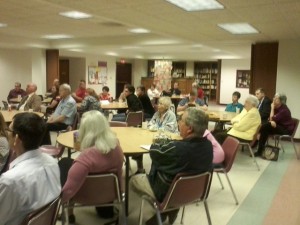
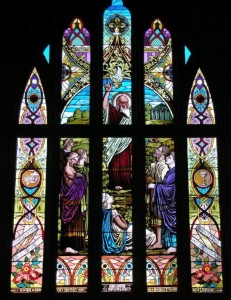 Lenten Journal, Day 32 – 5th Sunday in Lent
Lenten Journal, Day 32 – 5th Sunday in Lent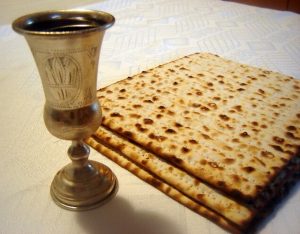 At the end of our gospel lesson this morning, Jesus said to the crowd, “It is my Father who gives you the true bread from heaven. For the bread of God is that which comes down from heaven and gives life to the world.” They said to him, “Sir, give us this bread always.” Jesus answered, “I am the bread of life. Whoever comes to me will never be hungry, and whoever believes in me will never be thirsty.”
At the end of our gospel lesson this morning, Jesus said to the crowd, “It is my Father who gives you the true bread from heaven. For the bread of God is that which comes down from heaven and gives life to the world.” They said to him, “Sir, give us this bread always.” Jesus answered, “I am the bread of life. Whoever comes to me will never be hungry, and whoever believes in me will never be thirsty.” In 2014, Evie and I were privileged to join a group of other pilgrims from Ohio and Michigan and spend not quite three weeks in Palestine and Israel visiting many of the sites we hear about in the Bible, especially the Christian holy places of the Gospel stories. One of those was a hilly place overlooking the Sea of Galilee called Tabgha. Until 1948, when the Israelis uprooted its residents, a village had been there for centuries; now it is simply an agricultural area and a place of religious pilgrimage.
In 2014, Evie and I were privileged to join a group of other pilgrims from Ohio and Michigan and spend not quite three weeks in Palestine and Israel visiting many of the sites we hear about in the Bible, especially the Christian holy places of the Gospel stories. One of those was a hilly place overlooking the Sea of Galilee called Tabgha. Until 1948, when the Israelis uprooted its residents, a village had been there for centuries; now it is simply an agricultural area and a place of religious pilgrimage.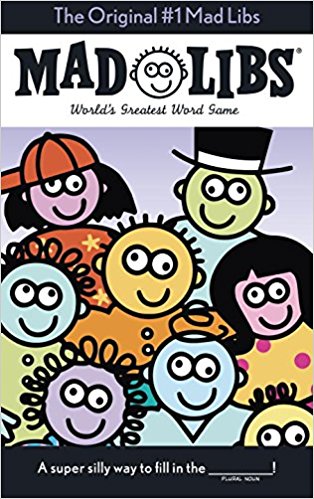 One of the commentaries I read this week about our gospel lesson was written by a Lutheran serminary professor named Jan Schnell Rippentrop. She noted three things about John the Baptizer’s self-description in the Fourth Gospel:
One of the commentaries I read this week about our gospel lesson was written by a Lutheran serminary professor named Jan Schnell Rippentrop. She noted three things about John the Baptizer’s self-description in the Fourth Gospel: Almighty God, on this day you opened the way of eternal life to every race and nation by the promised gift of your Holy Spirit who empowered the disciples to proclaim the Good News to peoples from many lands speaking many tongues: we now pray for those in many lands speaking many languages who have been hurt or killed by terrorist violence in the past fortnight in: London (England), Kabul (Afghanistan), Mosel (Iraq), Minya (Egypt), Khost (Afghanistan), Mastung (Pakistan), Gao (Mali), Borno State (Nigeria), Raqqa (Syria), Mogadishu (Somalia), rural Colombia, Manila (Philippines), Baghdad (Iraq), Basra (Iraq), Portland (Oregon, USA) and Manchester (England). May God grant eternal rest to the departed, healing to the injured, and comfort to those in grief. And since Jesus taught us to love and pray for our enemies, we pray also for those who have committed these violent acts, and for those who may be contemplating additional violence. May God change their hearts and shed abroad the gift of peace throughout the world by the preaching of the Gospel, that it may reach to the ends of the earth; through Jesus Christ our Lord, who lives and reigns with you, in the unity of the Holy Spirit, one God, for ever and ever. Amen.
Almighty God, on this day you opened the way of eternal life to every race and nation by the promised gift of your Holy Spirit who empowered the disciples to proclaim the Good News to peoples from many lands speaking many tongues: we now pray for those in many lands speaking many languages who have been hurt or killed by terrorist violence in the past fortnight in: London (England), Kabul (Afghanistan), Mosel (Iraq), Minya (Egypt), Khost (Afghanistan), Mastung (Pakistan), Gao (Mali), Borno State (Nigeria), Raqqa (Syria), Mogadishu (Somalia), rural Colombia, Manila (Philippines), Baghdad (Iraq), Basra (Iraq), Portland (Oregon, USA) and Manchester (England). May God grant eternal rest to the departed, healing to the injured, and comfort to those in grief. And since Jesus taught us to love and pray for our enemies, we pray also for those who have committed these violent acts, and for those who may be contemplating additional violence. May God change their hearts and shed abroad the gift of peace throughout the world by the preaching of the Gospel, that it may reach to the ends of the earth; through Jesus Christ our Lord, who lives and reigns with you, in the unity of the Holy Spirit, one God, for ever and ever. Amen.

